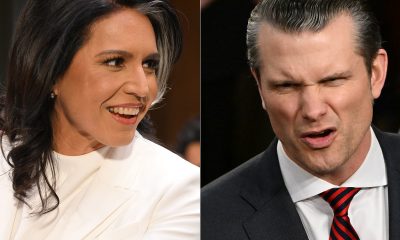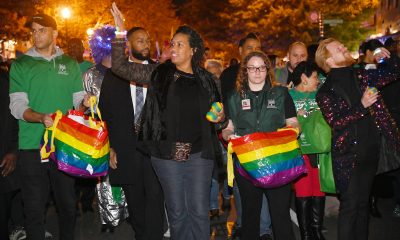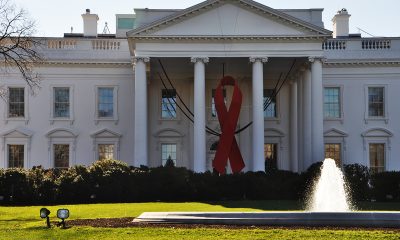News
Clinton’s VP pick Kaine reliable on LGBT rights
Running mate called ‘solidly pro-LGBT equality’ after evolution
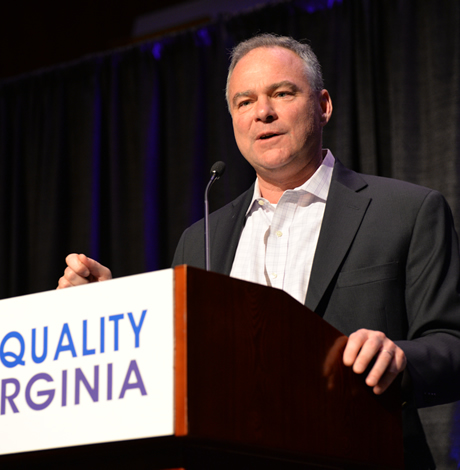
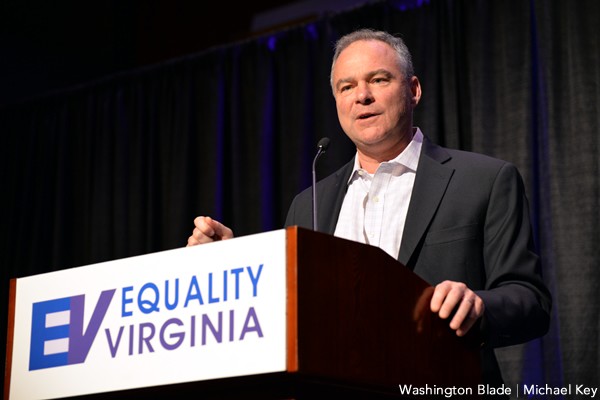
Hillary Clinton has selected Sen. Tim Kaine (D-Va.) as her running mate. (Washington Blade file photo by Michael Key)
Hillary Clinton has selected as her running mate a U.S. senator from Virginia who’s been a largely reliable voice in support of LGBT rights.
As first reported by The New York Times, Clinton announced late Friday her choice is Sen. Tim Kaine (D-Va.), who’s also former chair of the Democratic National Committee and former Virginia governor. A Spanish speaker, Kaine is set to make his joint campaign appearance with Clinton on Saturday in Miami.
Since his tenure as Virginia governor between 2006 and 2010, Kaine has taken action on behalf of LGBT rights. Upon taking office, Kaine signed an executive order barring anti-gay discrimination in the state workplace (the direction didn’t contain explicit protections on the basis of gender identity). His Republican successor, Virginia Gov. Bob McDonnell reversed the order, but Gov. Terry McAuliffe, a Democrat, reinstated it and added protections for gender identity.
Upon election to the U.S. Senate in 2012, Kaine generally hasn’t been at the forefront of initiatives advancing LGBT rights, but has rose to the occasion as needed. In the Human Rights Campaign’s most recent congressional scorecard, Kaine scored a “90” out of possible “100,” losing points for not co-sponsoring the Student Non-Discrimination Act and the Safe Schools Improvement Act.
Kaine is an original co-sponsor of comprehensive LGBT non-discrimination legislation known as the Equality Act. The senator also cast votes in favor of the Employment Non-Discrimination Act and an amendment along the lines of the Student Non-Discrimination Act. However, he isn’t a co-sponsor of the Therapeutic Fraud Prevention Act, which seeks to ban widely discredited “ex-gay” therapy nationwide by classifying it as fraud.
Kaine has signed amicus briefs urging the U.S. Supreme Court to overturn the Defense of Marriage Act and state bans prohibiting same-sex marriage. More recently, Kaine signed a brief urging the U.S. Second Circuit Court of Appeals to find sexual orientation discrimination is prohibited under current law.
In 2010, Kaine, as chair of the Democratic National Committee, took part in a three-and-a-half minute video to answer on questions on LGBT rights, outlining accomplishments already made under the Obama administration.
“We have a long way to go, but we’re already making progress for LGBT individuals,” Kaine says. “President Obama and congressional Democrats have already begun to address barriers to equality for LGBT Americans by guaranteeing these families the right to visit and make medical decisions for a partner in America’s hospitals, by enacting hate crimes legislation to protect LGBT Americans — to name just two significant accomplishments.”
Chad Griffin, president of the Human Rights Campaign, drew a stark contrast between Kaine and Indiana Gov. Mike Pence, whom Donald Trump has selected as his running mate.
“While Donald Trump doubled down on discrimination by picking Mike Pence, Hillary Clinton has bolstered her campaign’s historic commitment to LGBTQ equality by choosing Tim Kaine,” Griffin said. “Having proven time and time again that they have the experience, determination, and leadership needed to move equality forward for all Americans, we are confident Clinton and Kaine will tear down the walls of discrimination that hold all of us back.”
But Kaine, like many Americans, including President Obama and Clinton, appears to have gone through an evolution on LGBT rights. When running to become Virginia governor in 2006, Kaine said he didn’t support adoption by gay couples, but reversed his position by 2011.
Kaine was also initially opposed to same-sex marriage. Although he now supports marriage equality, it’s hard to say exactly when he changed his mind. In 2012, he sought to find a middle ground, not yet clearly supporting same-sex marriage, but backing some kind of relationship recognition.
“The underlying issue is, should committed couples have the same legal rights and responsibilities, and the answer to that is an unequivocal yes,” Kaine said, according to The Washington Post.
In 2013, when many U.S. senators declared their newfound support for same-sex marriage, Kaine joined them in declaring his support for marriage equality.
“I believe all people, regardless of sexual orientation, should be guaranteed the full rights to the legal benefits and responsibilities of marriage under the Constitution,” Kaine said at the time. “I hope the Supreme Court will affirm that principle.”
Rick Zbur, executive director of Equality California, said Kaine is “now solidly pro-LGBT equality” after undergoing the same kind ‘evolution’ on LGBT rights as the nation as a whole.
“With her selection of Sen. Tim Kaine, Hillary Clinton has highlighted the stark differences between her ticket and her opponent’s,” Zbur said. “In contrast to the extremes of racism, xenophobia, misogyny, and homo- and transphobia on display this week at the Republican National Convention, Kaine presents an alternative: a pragmatist who works across ideologies and across the aisle to get things done.”
Israel
Activist recalls experience in Tel Aviv after Israel-Iran war began
Marty Rouse was part of Jewish Federations of North America Pride mission

A long-time activist who was in Israel last month when its war with Iran began has returned to D.C.
Marty Rouse traveled to Israel on June 6 with the Jewish Federations of North America. The 5-day mission ended the night before the annual Tel Aviv Pride parade was scheduled to take place.
Mission participants met with Israeli President Isaac Herzog and several LGBTQ activists in Tel Aviv and Jerusalem. They visited the Western Wall, the Nova Music Festival site, and Nir Oz, a kibbutz in southern Israel that is less than a mile from the country’s border with the Gaza Strip. Mission participants also visited Sderot, a city that is roughly a mile from the Hamas-controlled enclave, a veterans rehabilitation facility, a new LGBTQ health center and the Aguda: The Association for LGBTQ Equality in Israel in Tel Aviv.
Hamas militants on Oct. 7, 2023, killed upwards of 360 partygoers and kidnapped dozens more at the music festival that was taking place at a campground near Re’im, a kibbutz that is roughly 10 miles southwest of Nir Oz. The militants killed or took hostage nearly a quarter of Nir Oz’s residents. They also took control of Sderot’s police station.

Tel Aviv Deputy Mayor Chen Arieli spoke at the mission’s closing party that took place at the Sheraton Grand, a hotel that overlooks Tel Aviv’s beachfront, on June 12.
Rouse and other mission participants planned to stay in Tel Aviv for the Pride parade, which was scheduled to take place the following day. He and Gordie Nathan, another mission participant who lives in Palm Springs, Calif., had checked into a nearby hotel that was less expensive.
“We said our farewells,” recalled Rouse when he spoke with the Washington Blade in D.C. on June 24. “We went to our hotels, and we get the warning, and then all hell broke loose.”
Israel early on June 13 launched airstrikes against Iran that targeted the country’s nuclear and military facilities.
Rouse said mission organizers told him and other participants who remained in Tel Aviv to meet at the Sheraton Grand for breakfast and dinner — Israel’s airspace was closed in anticipation of an Iranian counterattack, and authorities cancelled the Pride parade.
He said he went to bomb shelters at least twice a night for three nights.
Israel’s Home Front Command during the war typically issued warnings about 10 minutes ahead of an anticipated Iranian missile attack. Sirens then sounded 90 seconds before an expected strike.
Rouse and Nathan walked to the Sheraton Grand on June 13 when the Home Front Command issued a 10-minute warning. They reached the hotel in a couple of minutes, and staff directed them to the bomb shelter.
“You know to walk slowly, everything’s fine,” recalled Rouse. “You get 10 minutes, so everything was fine when the alarm goes off.”
Rouse described the Sheraton Grand shelter as “well lit” with WiFi, a television, and air conditioning. He was watching an Israeli television station’s live coverage of the Iranian missile attack when he saw one hit an apartment building in the Tel Aviv suburb of Ramat Gan.
A 74-year-old woman died and her boyfriend was seriously injured.
“I go over to look at the TV, just to watch,” recalled Rouse. “All of a sudden, you watch, and you see one bomb go and land and explode in Tel Aviv on TV. It landed and blew up.”
“I was like, okay, this is real, and so that was scary,” he added.
Rouse said the bomb shelter in the hotel where he and Nathan were staying after the mission ended was far less comfortable.
“It was dark. It was humid. It was hot. It was very uncomfortable,” said Rouse. “You really felt alone.”

Rouse and nearly everyone else on the mission who were in Tel Aviv when the war began left Israel on June 15. They boarded buses that took them to the Jordanian capital of Amman, which is a roughly 2 1/2-hour drive from Tel Aviv through the West Bank.
Rouse described the trip as “like a field trip” until they drove across the Jordan River and arrived at the Jordanian border crossing.
“You walk into this room, and instead of being in a well air-conditioned airport, you’re in this hot, humid, small place in the middle of the desert, packed with people, and those big, large, loud fans and pictures of military people on the walls,” he said. “It was almost like a Casablanca kind of feeling.”
Rouse said Jordanian authorities brought mission participants through customs in groups of 10. A Jewish Federations of North America liaison from Amman who previously worked as a tour guide for A Wider Bridge — a group that “advocates for justice, counters LGBTQphobia, and fights antisemitism and other forms of hatred” — went “behind closed doors” to ensure everyone was able to enter the country.
“It took a really long time,” Rouse told the Blade.

Mission participants arrived in Amman a short time later. They checked into their hotel and then had dinner at a restaurant.
“Now we feel like we’re safe and we’re in Amman,” recalled Rouse. “We’re sitting outside having a beautiful dinner.”
Iranian missiles passed over Amman shortly after Rouse and the other mission participants had begun to eat their dessert. They went inside the restaurant, and waited a few minutes before they boarded busses that brought them back to their hotel.
“No one was openly freaking out, which I was surprised by,” said Rouse.
The group was scheduled to fly from Amman to Cairo at 11 p.m. local time (4 p.m. ET) on June 16. They visited Jerash, an ancient city north of Amman, before their flight left Jordan.
“[The Jerash trip] actually took our minds off of everything,” said Rouse.
A Jewish Federations of North America contact met Rouse and the other mission participants at Cairo’s airport once their flight landed. Rouse arrived at JFK Airport in New York on June 17.
Trump-announced ceasefire ended 12-day war
President Donald Trump on June 23 announced a ceasefire that ended the 12-day war.
The U.S. three days earlier launched airstrikes that struck three Iranian nuclear sites. The ceasefire took effect hours after Iran launched missiles at a U.S. military base in Qatar.
Iran said the war killed more than 900 people in the country.
The Associated Press notes Iranian missiles killed 28 people in Israel. One of them destroyed Tel Aviv’s last gay bar on June 16.
The war took place less than two years after Oct. 7.
The Israeli government says Hamas militants on Oct. 7, 2023, killed roughly 1,200 people on that day when it launched its surprise attack on the country. The militants also kidnapped more than 200 people.
The Hamas-controlled Gaza Health Ministry says Israeli forces have killed nearly 55,000 people in the enclave since Oct. 7. Karim Khan, the International Criminal Court’s chief prosecutor, has said Israeli Prime Minister Benjamin Netanyahu and former Hamas leader Yahya Sinwar, who the IDF killed last October, are among those who have committed war crimes and crimes against humanity in Gaza and Israel.

Rouse upon his return to the U.S. said he “was never as aware of the comfort of another human being than I was during that time.” Rouse affectionately called Nathan his “bomb shelter boyfriend” and even questioned the way he reacted to the missile alerts.
“He’s sitting on the edge of the bed and he goes, okay, I’m going to put on my socks and my shoes, and I say, really? You’re going to put on your socks,” Rouse told the Blade. “The fact that I was nervous, that putting on socks might have changed the direction of our lives, to me was like I can’t believe I said that to him.”
Rouse quickly added Nathan helped him remain calm.
“If I was by myself, those nights would have been long enough,” said Rouse. “It’s a totally different feeling to be with another human that you know than to be by yourself.”

Rouse also praised the Jewish Federations of North America.
“JFNA really sprung into action and started to figure out all options to get us all safely home,” said Rouse. “It was all about logistics. Staff worked around the clock identifying and then mobilizing to get us back to the states. It was a great team effort and I know I speak for everyone in expressing our deep appreciation for their dedication to getting us safely home.”
Congress
Congress passes ‘Big, Beautiful Bill’ with massive cuts to health insurance coverage
Roughly 1.8 million LGBTQ Americans rely on Medicaid

The “Big, Beautiful Bill” heads to President Donald Trump’s desk following the vote by the Republican majority in the U.S. House of Representatives Thursday, which saw two nays from GOP members and unified opposition from the entire Democratic caucus.
To partially offset the cost of tax breaks that disproportionately favor the wealthy, the bill contains massive cuts to Medicaid and social safety net programs like food assistance for the poor while adding a projected $3.3 billion to the deficit.
Policy wise, the signature legislation of Trump’s second term rolls back clean energy tax credits passed under the Biden-Harris administration while beefing up funding for defense and border security.
Roughly 13 percent of LGBTQ adults in the U.S., about 1.8 million people, rely on Medicaid as their primary health insurer, compared to seven percent of non-LGBTQ adults, according to the UCLA School of Law’s Williams Institute think tank on sexual orientation and gender identities.
In total, the Congressional Budget Office estimates the cuts will cause more than 10 million Americans to lose their coverage under Medicaid and anywhere from three to five million to lose their care under Affordable Care Act marketplace plans.
A number of Republicans in the House and Senate opposed the bill reasoning that they might face political consequences for taking away access to healthcare for, particularly, low-income Americans who rely on Medicaid. Poorer voters flocked to Trump in last year’s presidential election, exit polls show.
A provision that would have blocked the use of federal funds to reimburse medical care for transgender youth was blocked by the Senate Parliamentarian and ultimately struck from the legislation — reportedly after the first trans member of Congress, U.S. Rep. Sarah McBride (D-Del.) and the first lesbian U.S. senator, Tammy Baldwin (D-Wis.), shored up unified opposition to the proposal among Congressional Democrats.
U.S. Supreme Court
Supreme Court to consider bans on trans athletes in school sports
27 states have passed laws limiting participation in athletics programs

The U.S. Supreme Court on Thursday agreed to hear two cases involving transgender youth challenging bans prohibiting them from participating in school sports.
In Little v. Hecox, plaintiffs represented by the ACLU, Legal Voice, and the law firm Cooley are challenging Idaho’s 2020 ban, which requires sex testing to adjudicate questions of an athlete’s eligibility.
The 9th U.S. Circuit Court of Appeals described the process in a 2023 decision halting the policy’s enforcement pending an outcome in the litigation. The “sex dispute verification process, whereby any individual can ‘dispute’ the sex of any female student athlete in the state of Idaho,” the court wrote, would “require her to undergo intrusive medical procedures to verify her sex, including gynecological exams.”
In West Virginia v. B.P.J., Lambda Legal, the ACLU, the ACLU of West Virginia, and Cooley are representing a trans middle school student challenging the Mountain State’s 2021 ban on trans athletes.
The plaintiff was participating in cross country when the law was passed, taking puberty blockers that would have significantly reduced the chances that she could have a physiological advantage over cisgender peers.
“Like any other educational program, school athletic programs should be accessible for everyone regardless of their sex or transgender status,” said Joshua Block, senior counsel for the ACLU’s LGBTQ and HIV Project. “Trans kids play sports for the same reasons their peers do — to learn perseverance, dedication, teamwork, and to simply have fun with their friends,” Block said.
He added, “Categorically excluding kids from school sports just because they are transgender will only make our schools less safe and more hurtful places for all youth. We believe the lower courts were right to block these discriminatory laws, and we will continue to defend the freedom of all kids to play.”
“Our client just wants to play sports with her friends and peers,” said Lambda Legal Senior Counsel Tara Borelli. “Everyone understands the value of participating in team athletics, for fitness, leadership, socialization, and myriad other benefits.”
Borelli continued, “The U.S. Court of Appeals for the Fourth Circuit last April issued a thoughtful and thorough ruling allowing B.P.J. to continue participating in track events. That well-reasoned decision should stand the test of time, and we stand ready to defend it.”
Shortly after taking control of both legislative chambers, Republican members of Congress tried — unsuccessfully — to pass a national ban like those now enforced in 27 states since 2020.
-

 U.S. Supreme Court3 days ago
U.S. Supreme Court3 days agoSupreme Court to consider bans on trans athletes in school sports
-

 Out & About3 days ago
Out & About3 days agoCelebrate the Fourth of July the gay way!
-

 Virginia3 days ago
Virginia3 days agoVa. court allows conversion therapy despite law banning it
-

 Maryland5 days ago
Maryland5 days agoLGBTQ suicide prevention hotline option is going away. Here’s where else to go in Md.

